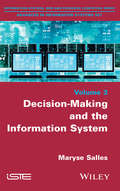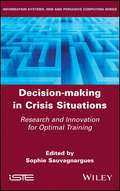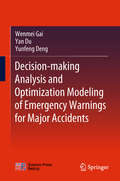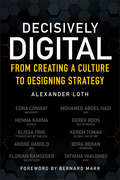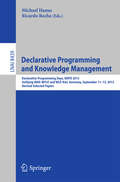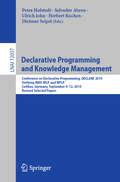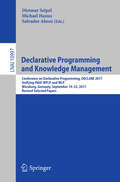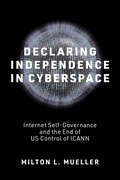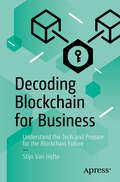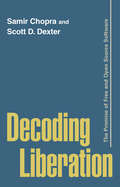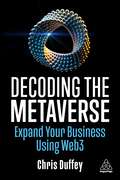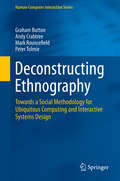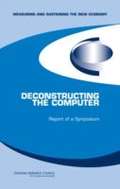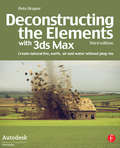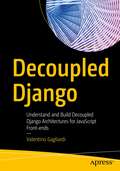- Table View
- List View
Decision-Making Analyses with Thermodynamic Parameters and Hesitant Fuzzy Linguistic Preference Relations (Studies in Fuzziness and Soft Computing #409)
by Zeshui Xu Peijia RenThe book introduces readers to some of the latest advances in and approaches to decision-making methods based on thermodynamic characters and hesitant fuzzy linguistic preference relations. By investigating the decision-making methods with thermodynamic parameters based on different information representatives, the book offers readers a novel perspective for solving problems under uncertainty. By exploring the consistency and consensus of hesitant fuzzy linguistic preference relations, the book gives readers efficient ways for preference analysis under uncertainty, chiefly intended for researchers and practitioners working in operations research, multi-attribute decision making, preference analysis, etc. The book can also be used as supplementary material for postgraduate and senior-year undergraduate students of the relevant professional institutions.
Decision-Making and the Information System
by Maryse SallesThe purpose of this book is to question the relationships involved in decision making and the systems designed to support it: decision support systems (DSS). The focus is on how these systems are engineered; to stop and think about the questions to be asked throughout the engineering process and, in particular, about the impact designers' choices have on these systems.
Decision-Making in Crisis Situations: Research and Innovation for Optimal Training
by Sophie SauvagnarguesThis book presents concepts and methods for optimal training for decision making in crisis situations. After presenting some general concepts of decision-making during crisis situations, it presents various innovations for optimal training, such as serious games, scenario design, adapted animation of crisis exercises, observation and debriefing of exercises related to pedagogical objectives.
Decision-making Analysis and Optimization Modeling of Emergency Warnings for Major Accidents
by Wenmei Gai Yan Du Yunfeng DengThis book highlights cutting-edge research into emergency early warning management and decision-making for severe accidents. Using toxic gas leakages as examples, it puts forward new design methods for emergency early warning systems, as well as a systematic description of emergency early warning information communication mechanisms and characteristics of regional evacuation, based on a wide range of theories, including safety engineering, information engineering, communication, behaviorology and others. The book applies a range of methods, such as case analysis, questionnaire interviews, and multi-objective optimization modeling. Drawing on this basis, it subsequently proposes a multi-objective optimization modeling and algorithm for emergency path selection, together with an evacuation risk assessment method. Divided into six chapters prepared by an international team of researchers, the book addresses the design of early warning systems, communication and dissemination mechanisms of early warning information, characteristics of regional evacuation, multi-objective optimization of emergency paths, and evacuation risk assessment. The book offers an essential reference guide for engineering technicians and researchers in a wide range of fields, including emergency management, safety science and engineering, disaster relief engineering, and transportation optimization, as well as graduate students in related majors at colleges and universities.
Decisively Digital: From Creating a Culture to Designing Strategy
by Alexander LothDiscover how to survive and thrive in an increasingly digital world Digital strategy should consist of more than just updating your business’ desktop computers and buying the newest smartphones for your employees. It requires the reimagining of existing business processes and the implementation of the latest technologies into current business activity to enable new capabilities for your firm. In Decisively Digital: From Creating a Culture to Designing Strategy, digital strategy advisor and author Alexander Loth leverages his extensive experience working with Microsoft, CERN, and SAP to deliver a robust and accessible exploration of what it takes for a company to unlock the potential of new digital technologies. You’ll discover how to: Utilize new technologies to establish a digital culture and realize the benefits of modern work for your employees Unleash the abilities that come with processing big data and taking advantage of data democracy, analytics, and cloud computing Implement artificial intelligence, blockchain, process automation, and IoT in a way that goes beyond the hype and delivers real business results Packed with interviews with industry leaders and real-world customer examples, Decisively Digital is ideal for CIOs, CDOs, and other executives and professionals who need to know how technology can improve their businesses and power results today and tomorrow.
Declarative Programming and Knowledge Management
by Michael Hanus Ricardo RochaThis book constitutes the proceedings of the Kiel Declarative Programming Days, KDPD 2013, unifying the following conferences: the 20th International Conference on Applications of Declarative Programming and Knowledge Management (INAP 2013), the 22nd International Workshop on Functional and (Constraint) Logic Programming (WFLP 2013) and the 27th Workshop on Logic Programming (WLP 2013), held in Kiel, Germany, in September 2013. The 15 papers presented were carefully and reviewed and selected for inclusion in this book. They cover the following topics: logic programming, constraint problem solving, programmable logic solvers, functional programming and constraint programming.
Declarative Programming and Knowledge Management: Conference on Declarative Programming, DECLARE 2019, Unifying INAP, WLP, and WFLP, Cottbus, Germany, September 9–12, 2019, Revised Selected Papers (Lecture Notes in Computer Science #12057)
by Salvador Abreu Dietmar Seipel Petra Hofstedt Ulrich John Herbert KuchenThis book constitutes revised selected papers from the 22nd International Conference on Applications of Declarative Programming and Knowledge Management, INAP 2019, the 33rd Workshop on Logic Programming, WLP 2019, and the 27th Workshop on Functional and (Constraint) Logic Programming, WFLP 2019. The 15 full papers and 1 short paper presented in this volume were carefully reviewed and selected from 24 submissions. The contributions present current research activities in the areas of declarative languages and compilation techniques, in particular for constraint-based, logical and functional languages and their extensions, as well as discuss new approaches and key findings in constraint-solving, knowledge representation, and reasoning techniques.
Declarative Programming and Knowledge Management: Declarative Programming Days, Kdpd 2013, Unifying Inap, Wflp, And Wlp, Kiel, Germany, September 11-13, 2013, Revised Selected Papers (Lecture Notes in Computer Science #8439)
by Michael Hanus Salvador Abreu Dietmar SeipelThis book constitutes revised selected papers from the 21st International Conference on Applications of Declarative Programming and Knowledge Management, INAP 2017, the 31st Workshop on Logic Programming, WLP 2017, and the 25th Workshop on Functional and (Constraint) Logic Programming, WFLP 2017. The 12 full papers presented in this volume were carefully reviewed and selected from 26 submissions. The contributions were organized in topical sections named: constraints; declarative systems; and functional and logic programming.
Declaring Independence in Cyberspace: Internet Self-Governance and the End of US Control of ICANN (Information Policy)
by Milton L. MuellerHow and why the US government gave up its control of ICANN, the global coordinator of internet names, numbers, and protocols—and what the geopolitical consequences were.In 1997 the United States decided that the Internet should be governed not by governments but by something called the &“global Internet community.&” In Declaring Independence in Cyberspace, Milton Mueller tells the story of why it took 20 years of organizational and geopolitical struggle to make that happen.ICANN (Internet Corporation for Assigned Names and Numbers), created in 1998, was the US government&’s answer to the question of who would control the Internet registries—a key part of the Internet infrastructure supporting domain names, network numbers, IP addresses, and other protocol parameters. Originally, ICANN was a bold institutional innovation based on a vision of Internet governance that was thoroughly globalized and independent of nation-states. Declaring Independence in Cyberspace explains where this vision came from, the problems posed by its implementation, and the organization&’s near-self destruction in its first five years.The US government refused to let go of ICANN for 15 years, triggering geopolitical conflicts over sovereignty and US power. Mueller details why, what prompted its change of heart, and how the problem of making ICANN accountable to its community in the absence of US government control sparked a political battle in Washington. His account gets to the very heart of a pressing question with profound global implications: Is state sovereignty the immutable foundation of global governance, or do new technological capabilities change the model?
Decoding Blockchain for Business: Understand the Tech and Prepare for the Blockchain Future
by Stijn Van HijfteBusiness professionals looking to understand the impact, future, and limitations of blockchain need look no further. This revolutionary technology has impacted business and the economy in unprecedented ways within the past decade, and it is only continuing to grow. As a leader in your organization, it is vital that you decode blockchain and optimize all the ways in which it can improve your business.Author of Decoding Blockchain for Business, Stijn Van Hijfte, expertly emphasizes the imperative of professionals in any sector of industry to understand the core concepts and implications of blockchain technology. Cryptocurrencies, cryptotrading, and constantly-changing tax structures for financial systems using blockchain technologies are covered in detail. The lasting effects of blockchain across specific industries such as media, real estate, finance, and regulatory bodies are addressed with an insightful eye from Van Hijfte.If not properly implemented with care and a foundation of knowledge, blockchain brings risks and uncertainties to a company. Know your technology to be ready for the present and the future, and stay ahead of the curve. Blockchain is here to stay, and Decoding Blockchain for Business is your professional roadmap. What You Will Learn Discover the risks associated with blockchain if not properly implemented Gain insights on how blockchain technology affects other booming topics such as AI, IoT, and RPA Look at the regulations surrounding Blockchain in different countries Who This Book Is For Business professionals looking to understand the impact, future, and limitations of Blockchain and how individuals and companies should prepare for this technology.
Decoding Cultural Heritage: A Critical Dissection and Taxonomy of Human Creativity through Digital Tools
by Fernando Moral-Andrés Elena Merino-Gómez Pedro ReviriegoThis book provides readers with an overview of the use of digital techniques for cultural heritage preservation. Those include image processing, advanced sensing, geomatics or virtual and augmented reality. The use of newer tools such as generative artificial intelligence for images and 3D or advanced natural language processing systems is also considered. The ultimate goal is to provide readers with a global perspective of the state of the art on the use of digital tools for cultural heritage applications, both for researchers and professionals involved in cultural heritage and for computer scientists and engineers that design and develop technologies that can be used for cultural heritage preservation.
Decoding Digital Consumer Behavior: Bridging Theory and Practice
by Alfonso PellegrinoThis book is a call to adopt more ethical, sustainable, and consumer-focused approaches in the digital era. The focus on consumer perceptions and expectations in a digital context is particularly relevant, as it delves into the psychological and behavioral aspects of digital interactions. The chapters on digital consumption and risk, and memory in the digital world, are pivotal in understanding how digital mediums impact consumer choices and brand recall. Online persuasion, a key topic, explores ethical and effective strategies for influencing consumer behavior, emphasizing the importance of authenticity and trust. The discussion on social comparison and its implications in digital consumption underscores the psychological impact of digital platforms. The chapters on humanistic and sustainable marketing, and digital customer experience, reflect the growing importance of ethical, sustainable practices, and customer-centric approaches in building brand loyalty. The book is an essential guide for marketing professionals and students, offering a comprehensive understanding of the complex interplay between digital marketing strategies and consumer behavior.
Decoding Liberation: The Promise of Free and Open Source Software (Routledge Studies in New Media and Cyberculture)
by Samir Chopra Scott D. DexterSoftware is more than a set of instructions for computers: it enables (and disables) political imperatives and policies. Nowhere is the potential for radical social and political change more apparent than in the practice and movement known as "free software." Free software makes the knowledge and innovation of its creators publicly available. This liberation of code—celebrated in free software’s explicatory slogan "Think free speech, not free beer"—is the foundation, for example, of the Linux phenomenon. Decoding Liberation provides a synoptic perspective on the relationships between free software and freedom. Focusing on five main themes—the emancipatory potential of technology, social liberties, the facilitation of creativity, the objectivity of computing as scientific practice, and the role of software in a cyborg world—the authors ask: What are the freedoms of free software, and how are they manifested? This book is essential reading for anyone interested in understanding how free software promises to transform not only technology but society as well.
Decoding Technology Acceptance in Education: A Cultural Studies Contribution (Routledge Research in Education)
by Caroline StockmanThe process of integrating technology into education often overlooks that technology is a sign; it is not a neutral message conveyor, but rather a material artefact placed into a context inevitably subject to culture. In an original and novel combination, Decoding Technology Acceptance in Education brings together two academic domains not previously pursued together, yet which diverge in many ways: cultural studies and technology acceptance studies. Drawing on empirical data, Stockman demonstrates that teachers activate a meaning-making process through encoding and decoding signs around technology as an artefact of culture, and as a result their acceptance behaviour and decisions rely on the dynamics of the cultural whole to which they belong. In this study, technology acceptance is revisited as an issue of cultural negotiation; the common approach, which provides an instrumental view on technology as a neutral tool, is insufficient for the topic of technology acceptance. Rather than proposing yet another model of technology acceptance, Decoding Technology Acceptance in Education offers a renewed frame of mind and the conclusions it provides are of vital importance to the theoretical and practical advancement of technology acceptance studies, as well as to the practical integration of technology into education. Providing original empirical evidence for the influence of culture on educational decision-making, the book raises awareness for the importance of cultural research in areas where it has been under-considered. This book will be of great interest to researchers, academics and postgraduate students engaged in the study of technology acceptance and technology use in education, as well as those interested in cultural studies.
Decoding the Metaverse: Expand Your Business Using Web3
by Chris DuffeyDiscover the profitable business opportunities within the metaverse and learn how you can and why you should get your company involved today. In Decoding the Metaverse, Creative Cloud strategist and Web3 expert Chris Duffey establishes a roadmap for entry to the metaverse. Written to help businesses get a handle on a complex new business opportunity, the book begins by explaining how previous iterations of the internet led to the creation of immersive digital technology with Web3 before detailing the building blocks of the metaverse. The book takes readers through the future of digital spaces, offering insight into immersive experiences, customer engagement, product-led growth and profitability. The chapters focus on the building blocks of the metaverse, including NFTs, blockchain, tokenomics, gaming and virtual real estate. Each chapter is paired with a corresponding case study from well-known brands currently working in the metaverse. Decoding the Metaverse ends with guiding principles about the ethical ramifications of immersive experiences and digital governance.Throughout Decoding the Metaverse, Duffey highlights the importance of reaching customers through shared immersive experiences. Showcasing the potential impact of working with Web3, he explains how companies can use these opportunities to further their reach and grow their revenue. Readers will step away from the book eager to get their companies involved today.
Decoding the World
by Arvind Gupta Po BronsonA vision of the future where the latest Silicon Valley tech meets cutting-edge genetics.Po Bronson and Arvind Gupta, venture capitalists from Silicon Valley, take everyday news headlines and decode them, leading us on a journey through their unique and highly entertaining view of the world. Each chapter is prefaced with a real-world headline from today's chaotic news cycle: Dying bees. Rogue planets. Beyond Meat. Glaciers melting. Bronson and Gupta decipher what's really going on behind these headlines, and why. They offer first-hand experience in funding technologies to solve these problems, most of which involve genetic engineering.But what the authors then do with that premise is always surprising and unexpected. One moment they are ripping it down to the bare bones physics or chemistry, and then they invoke history, philosophy, or psychology, all the while using joyful literary devices and storylines from popular movies. Decoding the World is the kind of book you get when you give two guys $40 million, a world full of messy big problems, a genetics laboratory to play in, and a set of Borges' collected works. After looking through their lens, you'll never see the world the same.(P)2020 Hachette Audio
Decoding the World: A Roadmap For The Questioner
by Arvind Gupta Po BronsonA vision of the future where the latest Silicon Valley tech meets cutting-edge genetics.Decoding the World is a buddy adventure about the quest to live meaningfully in a world with such uncertainty. It starts with Po Bronson coming to IndieBio.Arvind Gupta created IndieBio as a laboratory for early biotech startups trying to solve major world problems. Glaciers melting. Dying bees. Infertility. Cancer. Ocean plastic. Pandemics.As they travel around the world, finding scientists to join their cause, the authors bring their first-hand experience to the great mysteries that haunt our future. Natural resource depletion. Job-taking robots. China's global influence.Decoding the World is the kind of book you get when you give two guys $40 million, a world full of messy big problems, a genetics laboratory to play in, and a set of Borges' collected works. After looking through their lens, you'll never see the world the same.
Decolonial Pedagogy: Examining Sites of Resistance, Resurgence, and Renewal
by Njoki Nathani Wane Kimberly L. ToddThrough innovative and critical research, this anthology inquires and challenges issues of race and positionality, empirical sciences, colonial education models, and indigenous knowledges. Chapter authors from diverse backgrounds present empirical explorations that examine how decolonial work and Indigenous knowledges disrupt, problematize, challenge, and transform ongoing colonial oppression and colonial paradigm. This book utilizes provocative and critical research that takes up issues of race, the shortfalls of empirical sciences, colonial education models, and the need for a resurgence in Indigenous knowledges to usher in a new public sphere. This book is a testament of hope that places decolonization at the heart of our human community.
Decolonising Journalism Education in South Africa: Critical Perspectives (Routledge/UNISA Press Series)
by Colin Chasi Ylva Rodny-Gumede Zubeida Jaffer Mvuso PononoThis book is the culmination of several years of collaborative work. It is a unique contribution to the field of journalism because of the depth and variety of contributions it makes to the field. The scholars who contribute to this volume respond to the great need to rethink journalism from various perspectives including journalism training, research, the contents of the news media, language, media ethics, the safety of journalists and gender inequities in the news media. In doing this, they recognise how the societies that journalism address should themselves change.
Decolonising Political Communication in Africa: Reframing Ontologies (Routledge Contemporary Africa)
by Bruce Mutsvairo Beschara KaramThis book uses decolonisation as a lens to interrogate political communication styles, performance, and practice in Africa and the diaspora. The book interrogates the theory and practice of political communication, using decolonial research methods to begin a process of self-reflexivity and the creation of a new approach to knowledge production about African political communication. In doing so, it explores political communication approaches that might until recently have been considered subversive or dissident: forms of political communication that served to challenge imposed western norms and to empower African citizens and their histories. Centring African scholarship, the book draws on case studies from across the continent, including Zimbabwe, South Africa, Nigeria and Ghana. This book will be of interest to students and scholars of politics, media and communication in Africa.
Deconstructing Ethnography
by Peter Tolmie Mark Rouncefield Graham Button Andy CrabtreeThis book aims to deconstruct ethnography to alert systems designers, and other stakeholders, to the issues presented by new approaches that move beyond the studies of 'work' and 'work practice' within the social sciences (in particular anthropology and sociology). The theoretical and methodological apparatus of the social sciences distort the social and cultural world as lived in and understood by ordinary members, whose common-sense understandings shape the actual milieu into which systems are placed and used. In Deconstructing Ethnography the authors show how 'new' calls are returning systems design to 'old' and problematic ways of understanding the social. They argue that systems design can be appropriately grounded in the social through the ordinary methods that members use to order their actions and interactions. This work is written for post-graduate students and researchers alike, as well as design practitioners who have an interest in bringing the social to bear on design in a systematic rather than a piecemeal way. This is not a 'how to' book, but instead elaborates the foundations upon which the social can be systematically built into the design of ubiquitous and interactive systems.
Deconstructing the Computer: Report of a Symposium
by National Research Council of the National AcademiesStarting in the mid 1990s, the United States economy experienced an unprecedented upsurge in economic productivity. Rapid technological change in communications, computing, and information management continue to promise further gains in productivity, a phenomenon often referred to as the New Economy. To better understand this phenomenon, the National Academies Board on Science, Technology, and Economic Policy (STEP) has convened a series of workshops and commissioned papers on Measuring and Sustaining the New Economy. This major workshop, entitled Deconstructing the Computer, brought together leading industrialists and academic researchers to explore the contribution of the different components of computers to improved price-performance and quality of information systems. The objective was to help understand the sources of the remarkable growth of American productivity in the 1990s, the relative contributions of computers and their underlying components, and the evolution and future contributions of the technologies supporting this positive economic performance.
Deconstructing the Elements with 3ds Max: Create natural fire, earth, air and water without plug-ins
by Pete Draper3ds Max is the leading 3D modeling, animation, and rendering solution for artists, schools, and production environments. The unique tutorial approach of this book permits readers to learn essential techniques that every 3D artist needs to create CG environments by recreating the earth's elements of earth, air, fire and water. No extra plug-ins are required to perform the exercises. Draper studies the real world and then simlates it with 3ds Max -a unique approach that reflects classical art training."Deconstructing the Elements" allows artists to re-create natural effects using Autodesk® 3ds Max®. This new edition boasts all new tutorials. All editorial content is updated to be current with the current version of 3ds Max. Inspirational images cover every page as the author shares his professional insight, detailing the how and why of each effect, ensuring the reader a complete understanding of all the processes involved. The companion web site includes all of the tutorials from the previous two editions, only available to purchasers of this 3rd edition - plus all new tutorials of the current edition. It's like getting 3 books in one!
Deconstruction Machines: Writing in the Age of Cyberwar (Electronic Mediations #54)
by Justin JoqueA bold new theory of cyberwar argues that militarized hacking is best understood as a form of deconstruction From shadowy attempts to steal state secrets to the explosive destruction of Iranian centrifuges, cyberwar has been a vital part of statecraft for nearly thirty years. But although computer-based warfare has been with us for decades, it has changed dramatically since its emergence in the 1990s, and the pace of change is accelerating.In Deconstruction Machines, Justin Joque inquires into the fundamental nature of cyberwar through a detailed investigation of what happens at the crisis points when cybersecurity systems break down and reveal their internal contradictions. He concludes that cyberwar is best envisioned as a series of networks whose constantly shifting connections shape its very possibilities. He ultimately envisions cyberwar as a form of writing, advancing the innovative thesis that cyber attacks should be seen as a militarized form of deconstruction in which computer programs are systems that operate within the broader world of texts. Throughout, Joque addresses hot-button subjects such as technological social control and cyber-resistance entities like Anonymous and Wikileaks while also providing a rich, detailed history of cyberwar. Deconstruction Machines provides a necessary new interpretation of deconstruction and timely analysis of media, war, and technology.
Decoupled Django: Understand and Build Decoupled Django Architectures for JavaScript Front-ends
by Valentino GagliardiApply decoupling patterns, properly test a decoupled project, and integrate a Django API with React, and Vue.js. This book covers decoupled architectures in Django, with Django REST framework and GraphQL. With practical and simple examples, you’ll see firsthand how, why, and when to decouple a Django project. Starting with an introduction to decoupled architectures versus monoliths, with a strong focus on the modern JavaScript scene, you’ll implement REST and GraphQL APIs with Django, add authentication to a decoupled project, and test the backend. You’ll then review functional testing for JavaScript frontends with Cypress. You will also learn how to integrate GraphQL in a Django project, with a focus on the benefits and drawbacks of this new query language. By the end of this book, you will be able to discern and apply all the different decoupling strategies to any Django project, regardless of its size.What You'll Learn Choose the right approach for decoupling a Django projectBuild REST APIs with Django and a Django REST frameworkIntegrate Vue.js and GraphQL in a Django projectConsume a Django REST API with Next.jsTest decoupled Django projects Who This Book Is ForSoftware developers with basic Django skills keen to learn decoupled architectures with Django. JavaScript developers interested in learning full-stack development and decoupled architectures with Django.

